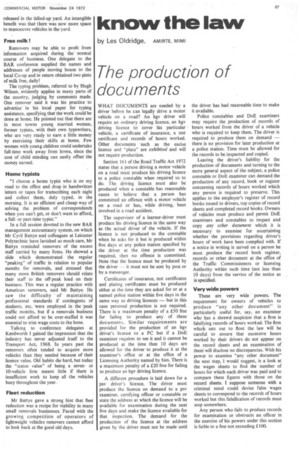know the law
Page 63

If you've noticed an error in this article please click here to report it so we can fix it.
The production of documents
by Les Oldridge, AMIRTE, MIMI WHAT DOCUMENTS are needed by a driver before he can legally drive a motor vehicle on a road? An hgv driver will require an ordinary driving licence, an hgv driving licence to cover his particular . vehicle, a certificate of insurance, a test certificate and records of hours worked. Other documents such as the excise licence and "plate" are exhibited and will not require production.
Section 161 of the Road Traffic Act 1972 states that a person driving a motor vehicle on a road must produce his driving licence to a police constable when required so to do. The driving licence must also be produced when a constable has reasonable cause to believe that a person has committed an offence with a motor vehicle on a road or has, while driving, been involved in a road accident.
The supervisor of a learner-driver must produce his driving licence in the same way as the actual driver of the vehicle. If the licence is not produced to the constable when he asks for it but is produced within five days at any police station specified by the driver at the time production was required, then no offence is committed. Note that the licence must be produced by the driver it must not be sent by post or by a messenger.
Certificates of insurance, test certificates and plating certificates must be produced either at the time they are asked for or at a named police station within five days in the same way as driving licences — but in this case personal production is not required. There is a maximum penalty of a £50 fine for failing to produce any of these documents. Similar requirements are provided for the production of an hgv driver's licence to a PC but if a DoE examiner requires to see it and it cannot be produced at the time then 10 days are allowed for the driver to produce it at the examiner's office or at the office of a Licensing Authority named by him. There is a maximum penalty of a £20 fine for failing to produce an hgv driving licence.
A different procedure is laid down for a psv driver's licence. The driver must produce the licence on demand to a psv examiner, certifying officer or constable or state the address at which the licence will be available for examination during the next five days and make the licence available for that inspection. The demand for the production of the licence at the address given by the driver must not be made until the driver has had reasonable time to make it available.
Police constables and DoE examiners may require the production of records of hours worked from the driver of a vehicle who is required to keep them. The driver is required to produce them on demand — there is no provision for later production at a police station. Time must be allowed for the records to be inspected and copied.
Leaving the driver's liability for the production of documents and turning to the more general aspect of the subject, a police constable or DoE examiner can demand the production of any record, book or register concerning records of hours worked which any person is required to preserve. This applies to the employer's register of record books issued to drivers, top copies of record sheets and completed record books. Owners of vehicles must produce and permit DoE examiners and constables to inspect and copy any other document which it is necessary to examine for ascertaining whether the provisions regarding driver's hours of work have been complied with. If a notice in writing is served on a person he must produce the record book register, records or other document at the office of the Traffic Commissioners or licensing Authority within such time (not less than 10 days) from the service of the notice as is specified.
Very wide powers These are very wide powers. The requirement for owners of vehicles to produce "any other document" is particularly useful for, say, an examiner who has a shrewd suspicion that a firm is falsifying records of hours worked. The firm which sets out to flout the law will be careful to ensure that excessive hours worked by their drivers do not appear on the record sheets and an examination of them' will disclose no discrepancies. With his power to examine "any other document" the next step, I would suggest, is a look at the wages sheets to find the number of hours for which each driver was paid and to compare these figures with those on the record sheets. I suppose someone with a criminal mind could devise false wages sheets to correspond to the records of hours worked but this falsification of records must stop somewhere.
Any person who fails to produce records for examination or obstructs an officer in the exercise of his powers under this section is liable to a fine not exceeding £100.












































































































